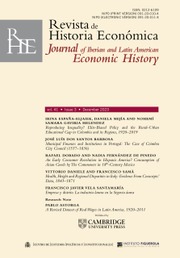Article contents
Bienestar y pobreza. El impacto del sistema de herencia castellano en Cádiz, el «Emporio del Orbe» (1700–1810 )1
Published online by Cambridge University Press: 28 April 2010
Abstract
The continuity of big mercantile houses established in Western Andalusia during die eighteenth century was jeopardized not only due to die political and economic crisis of the end of the century, but also due to another source of instability that has received little attention in economic history: the equalitarian principles of the Castilian hereditary system, whose aim was to safeguard the transmission of family wealth between generations. Castilian hereditary law and customs promoted family well-being, but die equalitarian division of patrimonies also had the result of forcing die dispersion of fortunes, dierefore hindering the continuity of numerous mercantile family firms. This article studies the effects of die Castilian hereditary system in Cádiz during the eighteen century, when die Andalusien city held the legal monopoly of trade between Spain and its American possessions. The study also analyzes some of the mechanisms that die Cádiz mercantile elites used in order to bequeath more concentrated patrimonies.
Resumen
La continuidad de las grandes casas mercantiles establecidas en la Andalucía occidental durante el siglo XVIII se vio obstaculizada no sólo por la crisis política y económica finisecular, sino también por un factor estructural hasta ahora poco analizado en la historia económica: el sistema hereditario castellano. La legislación y las prácticas hereditarias castellanas protegieron la transmisión intergeneracional de los patrimonios familiares y por ello fomentaron el bienestar de las familias. El reparto igualitario castellano, sin embargo, tuvo también el resultado de propiciar la disgregación de importantes patrimonios, dificultando la pervivencia de numerosas empresas mercantiles de carácter familiar. El presente trabajo representa una aproximación a este tema, estudiando algunos de los principales efectos que tuvo el sistema hereditario castellano en Cádiz, y algunos de los frecuentes mecanismos utilizados por la elite mercantil gaditana para transmitir patrimonios más concentrados en el siglo XVIII, época en la que la ciudad andaluza tuvo el monopolio del comercio legal entre España y sus posesiones en América.
- Type
- Artículos
- Information
- Revista de Historia Economica - Journal of Iberian and Latin American Economic History , Volume 15 , Issue 2 , September 1997 , pp. 243 - 268
- Copyright
- Copyright © Instituto Figuerola de Historia y Ciencias Sociales, Universidad Carlos III de Madrid 1997
References
BIBLIOGRAFÍA
- 3
- Cited by




